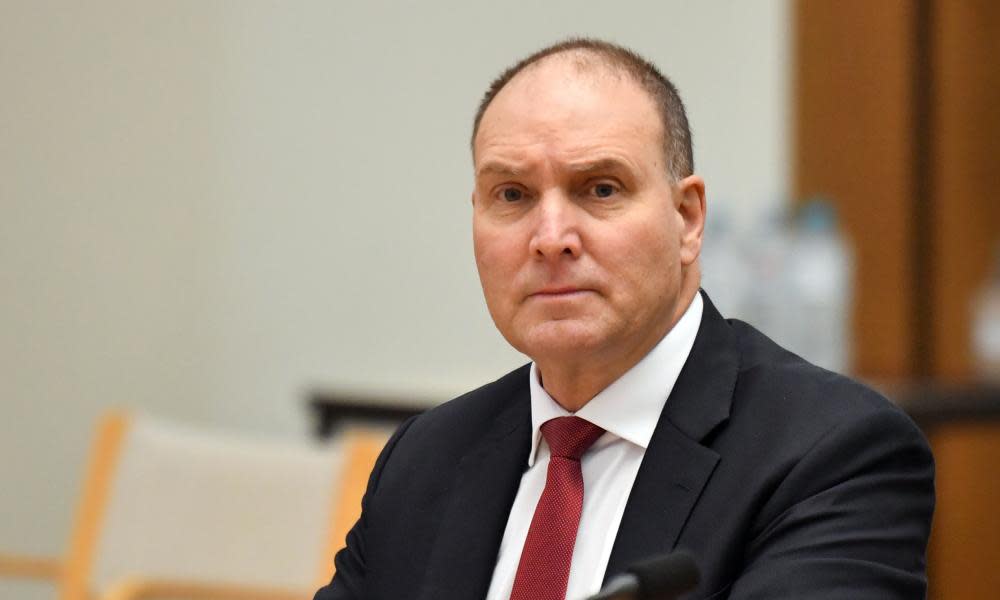Covid commission chief distances himself from leaked report on massive gas expansion

The former Fortescue Metals chief running Scott Morrison’s Covid-19 coordination commission, Nev Power, has distanced himself from a controversial leaked report recommending Australian taxpayers underwrite a massive expansion of the domestic gas industry.
Appearing on Thursday before a Senate committee, Power said the report, revealed by Guardian Australia late last month, should not be considered the view of the National Covid-19 Coordination Commission. He intimated the report was a draft from the manufacturing taskforce that had been superseded by later advice.
The leaked report from the taskforce headed by Andrew Liveris, a former Dow Chemical executive and current Saudi Aramco board member, recommended the government underwrite an increased national gas supply, that government agencies partner with companies to accelerate development of new fields such as the Northern Territory’s vast Beetaloo Basin, and states introduce subsidy schemes for gas-fired power plants.
Related: Who is eligible for homebuilder grants, and how much will they have to spend?
It also proposed a role for government in helping develop gas pipelines between eastern states and the north, and potentially a $6bn trans-Australian pipeline between the east and west, by either taking an equity position, minority share or underwriting investments.
But Power told the Senate inquiry the commission was not recommending the government subsidise gas.
He did indicate, however, that the commission was looking at subsidised infrastructure. “The commission is not recommending any subsidised delivery of gas or any other energy system, but we have talked about the provision of infrastructure to reduce the costs of transportation and deliver lower costs,” the NCCC chairman said.
Power’s role leading the NCCC has raised concerns among a range of civil society groups about potential conflicts of interest because the commission has heavily promoted gas development as a way to boost economic growth after the coronavirus crisis. The escalating public controversy about commercial conflicts prompted Power to step aside from his position as deputy chairman of a gas company, Strike Energy.
The NCCC chairman told Thursday’s hearing he stood by his view “that we should be looking at competitive gas supply for its potential as a raw material for both existing and new manufacturing industry to preserve and create jobs”. He said he agreed with Alan Finkel, the chief scientist, “that there is a role for gas in firming up renewables as we transition to lower emissions”.
But Power acknowledged there was a “perceived conflict”, given his corporate interests.
He said he had not attended a board meeting of Strike Energy since he joined the commission and “I have not voted on any operational or strategic matters and will not while I am at the NCCC”. But in response to questions from the Labor senator Murray Watt, Power said he “probably” was still being paid a director’s fee.
Asked whether the development of a trans-continental pipeline would benefit Strike Energy, an oil and gas exploration company, Power replied “no, not necessarily”.
Power was asked to confirm whether he remained a shareholder in Fortescue, and whether the proposed pipeline would benefit that company. He confirmed he remained a shareholder in Fortescue, and he acknowledged that FMG had lobbied for a trans-continental gas pipeline when he was the chief executive. But Power said Fortescue would not benefit from the pipeline now, because it had not developed gas interests.
Asked whether he had recused himself from discussions among commissioners about developing gas as part of the Covid-19 recovery, Power replied: “No, I haven’t.”
In response to questions about his remuneration, Power confirmed he was being paid $267,345 to cover his expenses. He said the money was paid into a trust, and he said the trust paid tax in according with tax office rules. Officials from the Department of the Prime Minister and Cabinet said Power was not required to keep receipts to demonstrate expenses.
Power commutes to Canberra on a private aircraft. He told the hearing he piloted the plane, and had periodically given Perth-based government ministers a ride home to the west during the Covid crisis. He had sought and been granted an exemption for travel, because WA has closed the border. Power was also granted an exemption to fly to Queensland to manage his private agricultural interests.
Malcolm Thompson, the deputy chief executive officer of the NCCC, told the hearing commissioners had procedures to declare conflicts of interest. At a hearing of the Senate committee in mid-May, NCCC officials said Liveris was not required to make a disclosure because he was an adviser to the commission, not a commissioner.
But on Thursday, Thompson told the committee Liveris had now been required to make a conflict of interest declaration. He said declarations had also been sought from the chair and all the members of an industrial relations taskforce appended to the commission.
Thompson also indicated the budget for the NCCC had increased from $3m to $5.4m.

 Yahoo News
Yahoo News 
